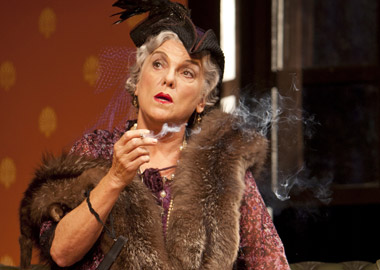The last production I saw of The Importance of Being Ernest was spoiled by the actors struggling to get their American tongues around Oscar Wilde’s so veddy English epigrams and their bodies into appropriately Victorian attitudes. For theaters on this side of the pond, staging that master of sparkling repartee is a perennial challenge. But David Hyde Pierce, who delivered his share of snappy witticisms on TV’s Frasier, had an inspiration based on a wacky insight.
To Pierce, Wilde’s stilted diction is a close cousin to that of Damon Runyon, the bard of Broadway, whose characters’ colorful locutions are immortalized in Guys and Dolls. What if, he mused, Wilde’s English gentry were instead American gangsters of the 1930s and their molls? After all, as he points out in his director’s notes, stateside mobsters did in fact take refuge in England from the not-that-long arm of the law, as well as from bloodthirsty rivals, and American ladies from wealthy families are known to have married into the impoverished English nobility, exchanging fresh greenbacks for ancient titles. He rests his case with a quote from Wilde himself, who found “something pleasurable in seeing… the same subject under different conditions of art.”
In this alternate universe, the imperious Lady Bracknell is the godmother of an East Coast mob family who is now ensconced in London with her purchased peerage; her nephew Algernon and his friend Jack are goodfellas enjoying the city and country life, respectively, with their ill-gotten loot; and the female objects of their affections are ex-flappers striving to become proper ladies. Pierce, who got his start as a young actor at Williamstown, brought his premise to the festival’s new director, Jenny Gersten, who found it—dare I say?—an offer she could not refuse.
So does it work? For me, almost.
The conceit is actually pretty convincing. I just think it’s not taken far enough. Pierce’s ex-pats only rarely approach the exuberant formality of Runyon’s wise guys. They tend to underplay the epigrammatic quips instead of playing up the contrast—and comic possibilities—of Wilde’s gentlemen and ladies to the manner born and Runyon’s streetwise urbanites whose pseudo-elegant diction amusingly betrays their déclassé origins.
The most successful scenes come in the second act of this comedy of double identities, when Gwendolyn and Cecily (Amy Spanger and Helen Cespedes) engage in a verbal cat fight that plays like a sendup of Jersey Shore, and the two “Ernests” (Louis Cancelmi and Glenn Fitzgerald) wage a turf battle over a plate of muffins. As Lady Bracknell, whose every entrance is preceded by an armed bodyguard who frisks everyone, Tyne Daly’s sang is as froid as any blueblood English dame’s, while her accent is as Broadway as Nathan Detroit’s.
She and her fellow actors don’t burlesque their roles, as the stylistic conceit might tempt them to, and that’s a good thing. But there’s a bit too much restraint—perhaps too much deference to the original—and that’s where Pierce’s parallel world fails to quite live up to its outlaw potential.?
Through July 14, Williamstown Theatre Festival, Williams College, Williamstown, (413) 597-3400, wtfestival.org.
Contact Chris Rohmann at StageStruck@crocker.com.



